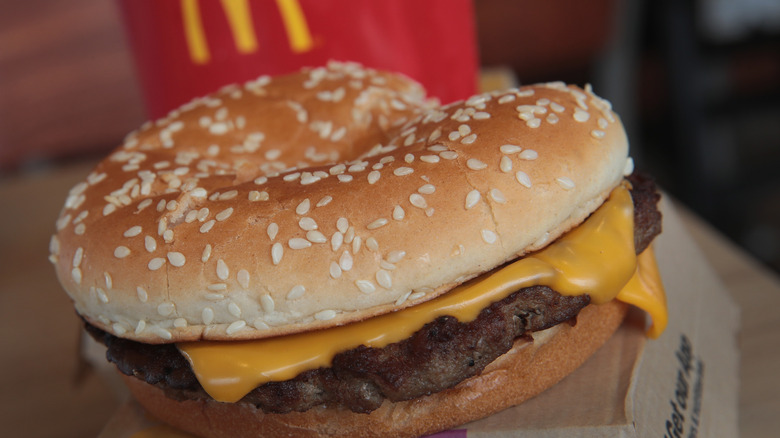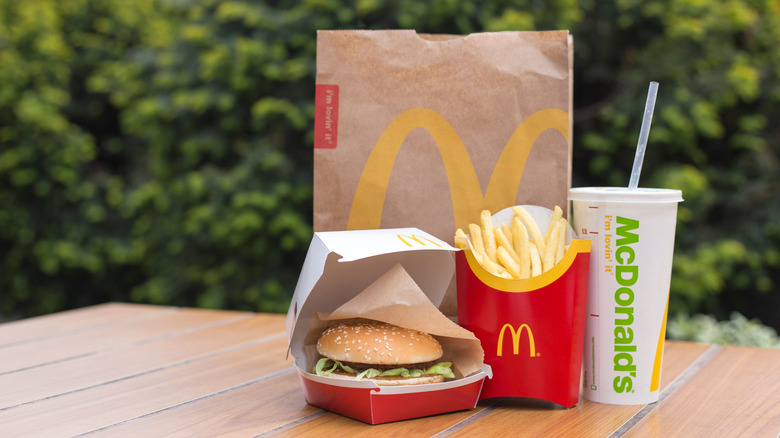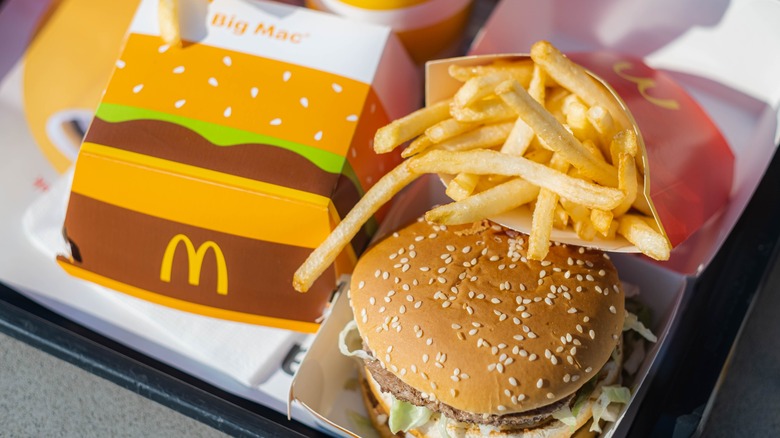Is McDonald's Tricking Us With The Size Of Its Quarter Pounder Burgers?
In addition to inflation, consumers are also becoming aware of shrinkflation when it comes to the products they buy. Shrinkflation is a term coined for when a company downsizes its portions while charging the same price. Some McDonald's fans swear that the burger chain has shrunk its burgers in recent years and that the patties are smaller than they previously were. A Reddit thread discusses the question, with plenty of users offering input.
But how would McDonald's shrink its quarter pounder when the burger gets its name from the weight of its patty? Well, former McDonald's Chef Mike Haracz shared some theories for how the company may secretly be tricking customers, but it should be noted that these are theories on his part. The former company chef says that McDonald's may be altering the lean-to-fat ratio of its patties. "It may be the same weight, but there's more fat in it. When that fat renders out, the finished product is smaller."
Haracz suspects McDonald's started putting raw onions on its patties while on the grill. According to Haracz, the veggie soaks up some of that rendered fat. Haracz also speculates that the company may be narrowing in on the weight fluctuation range it allows during manufacturing.
One customer sued McDonald's
Chef Mike Haracz isn't the only one speculating over McDonald's burger sizes. One customer actually felt incensed enough to file litigation. In a court case decided in October 2023, one customer accused both McDonald's and Wendy's burgers of being smaller than advertised. The customer argued that the burgers seen in ads by both companies were undercooked to make the sandwiches seem larger than they were.
Ground beef does indeed shrink when cooked as moisture and fat escape from the meat. The exact amount of shrinkage depends on the hamburger mix and the cooking time. However, the customer couldn't prove to the judge that this claim about McDonald's or Wendy's burgers was valid. Likewise, they failed to show that the commercial influenced their decision to buy sandwiches at either location. Ultimately, the judge decided to throw out the case, given its faulty basis. However, it's hardly the first time McDonald's has been called out for its food failing to reflect its ads.
Currently, it's hard to say with a degree of certainty that McDonald's patties are any smaller than they have previously been. However, there's one way that consumers are losing money.
McDonald's has raised its prices
Whether its burgers remain the same size or not, customers generally get less for their money than they have in years past. Due to inflation, prices at McDonald's have increased. McDonald's quarter pounder has increased from $5.14 on average to $5.45 in just one year.
McDonald's has also raised its prices in regions like California, citing the need to offset increased expenses as the cost of labor rises. In total, McDonald's has raised its prices four times in only the past few years. The price increase hasn't gone unnoticed by customers, who have become increasingly displeased with rising food costs. One customer on Reddit wrote, "A Big Mac Meal is $13.10. Why even eat here anymore. It's no longer a poor man's food."
Perhaps the question shouldn't be whether McDonald's burgers have shrunk; rather, has the company lost goodwill with its customers? And if so, how can McDonald's win them back?


